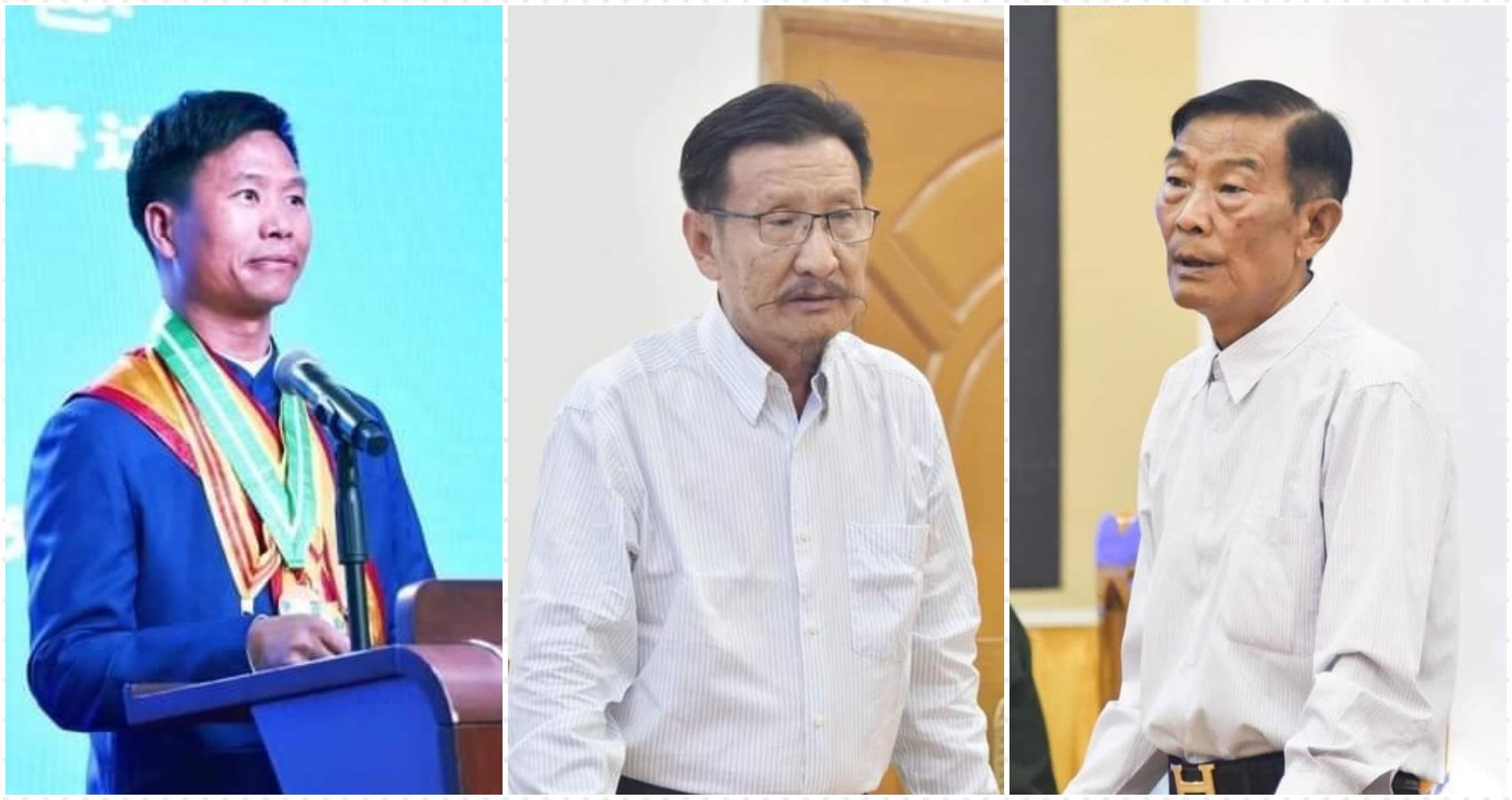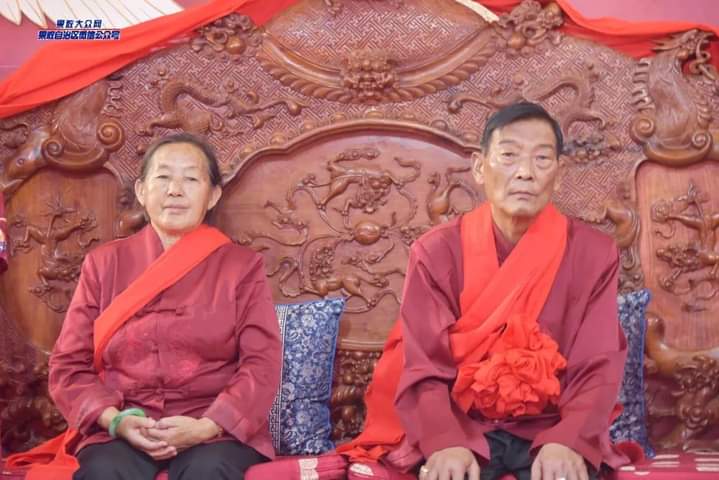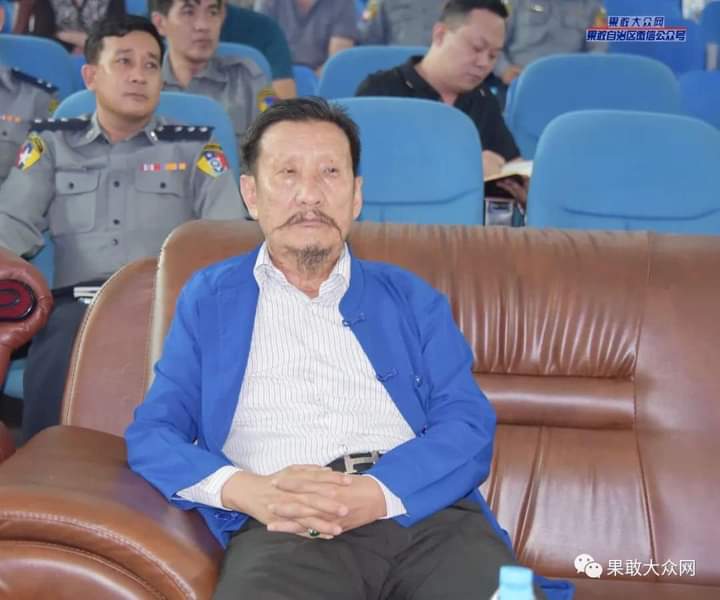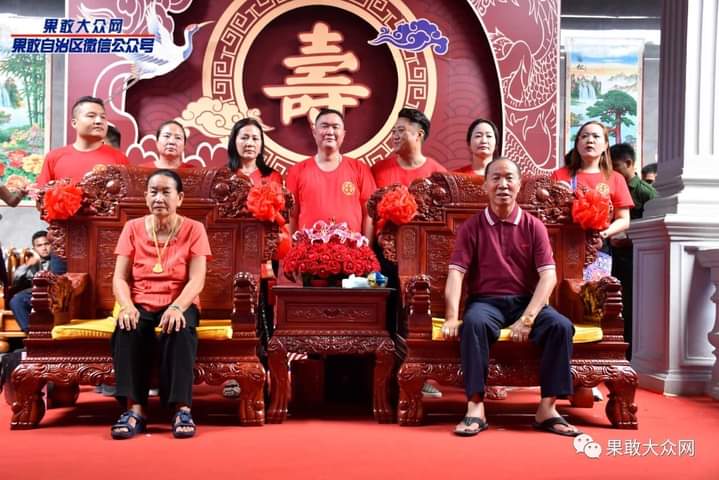The online scam syndicates operating near the Chinese border in Shan State’s Kokang region were raking in more than 100 billion yuan (US$ 14 billion) annually and were run by four families affiliated with Myanmar’s military, the commander of an ethnic army fighting to take control of the region said.
Myanmar National Democratic Alliance Army (MNDAA) leader Peng Deren, also known as Peng Dashun, made the comments in his New Year’s message.
Four “big families” ran hundreds of online scams that together had as many as 100,000 people working for them in Kokang Self-Administrative Zone’s Laukkai Town before it was attacked by the Brotherhood Alliance, Peng said.
Myanmar’s military regime used helicopters to rescue leaders of the cyber-crime syndicates from the town when it was attacked, Peng said.
His MNDAA is one of three ethnic armies that comprise the Brotherhood Alliance. Together, they launched Operation 1027 on Oct. 27 last year to drive junta troops out of northern Shan State.
The four families who run the syndicates are protected by the junta, Peng said, referring to the Bai, Wei, and two Liu clans.

Their patriarchs are former chair of Kokang SAZ Bai Suocheng, Kokang Border Guard Force leader Wei San, former lawmaker from the military-backed Union Solidarity and Development Party (USDP) Liu Guoxi and the richest man in Laukkai, Liu Zhengxiang.
Myanmar’s military and the four families have been engaged in industrial-scale drug production and cyber crimes in Kokang for 14 years – 2009 to 2023 – turning it into a hub for cyber crime, Peng said.
The online fraud syndicates have used trafficked Chinese nationals as forced labor – a crime that became a foreign-policy priority for Beijing after the junta failed to take meaningful action against it when China asked it to do so.
The Brotherhood Alliance included eliminating online scam syndicates as a goal of Operation 1027, along with defeating the military dictatorship.
On Wednesday, in response to Peng’s allegation, pro-junta newspapers denied that online scam syndicate leaders had been rescued from Laukkai by Myanmar military helicopters, saying the allegation was misinformation.
However, prior to Peng’s allegation reports said that leading Kokang businessmen were rescued from Kokang and transported to Naypyitaw during Operation 1027.
Members of the four “big families” have also received honorary titles from junta boss Min Aung Hlaing. They are former lawmakers from the military’s proxy party, the USDP, and military loyalists.
“The four big families have been very arrogant because they are backed by the regime,” Peng said in his New Year’s message.
Min Aung Hlaing’s connections

In 2009, when junta boss Min Aung Hlaing led the North-Eastern Command – which oversees Shan State – Bai Suocheng was the deputy commander of the MNDAA. He sided with Myanmar’s military to drive his superior, Peng Jiasheng – the father of Peng Deren – out of Kokang. Bai then became a lawmaker in the military’s proxy party, the USDP, and led Kokang SAZ under Thein Sein’s quasi-civilian government.
Peng Deren, whose father died in February 2022, is now trying to retake Kokang. The MNDAA has seized control of Kunlong, Chin Shwe Haw, Konkyan and much of Laukkai, the zone’s capital.
When Peng Jiasheng launched an offensive 2015 in an attempt to retake control of Kokang, Min Aung Hlaing had Bai Suocheng evacuated to Naypyitaw by helicopter.
Bai Suocheng’s eldest son, Bai Yingneng, is a former USDP lawmaker and former executive committee member for Kokang SAZ. His second son, Bai Yingcang, is a local militia leader who has frequently attended government-organized events in Naypyitaw. The Bai clan – particularly Suocheng and Yingneng – are very close to Min Aung Hlaing.
The junta gave Bai Yingneng an honorary title last year for promoting Buddhism. It was conferred on him in Naypyitaw by deputy junta chief Soe Win. When Bai Yingneng’s motorcade was attacked by the MNDAA in 2021, the Myawaddy Daily – the Myanmar military’s mouthpiece – reported on the attack in elaborate detail underscoring how closely the military was connected to the family.
After Peng Jiasheng was driven out of Kokang by Min Aung Hlaing in 2009, Wei Chaoren’s younger brother Wei San (also known as Wei Huairen) led Kokang Border Guard Force (BGF) Battalion 1006, which was formed by Myanmar’s military. Even in retirement, he still chairs the central advisory and command committee of the Kokang BGF.
Min Aung Hlaing conferred the honorary title Agga Maha Thiri Sudhamma Mani Jotikadhaja on Liu Zhengxiang (also known as Liu Abao), the owner of Fully Light Group of Companies, the biggest conglomerate in Kokang. Liu’s younger brother, Maung Maung, received the same honorary title. It was personally conferred on him by Min Aung Hlaing in Naypyitaw.
Jason Tower, Myanmar country director for the United States Institute of Peace, said Liu Zhengxiang and his conglomerate were among Min Aung Hlaing’s top go-to crony companies. The conglomerate is involved in major projects across Myanmar, including key real-estate and energy projects. It had also been a key player in cross-border trade with China.
Together with Bai Suocheng, Liu Guoxi rebelled against Peng Jiasheng in 2009. He also became a USDP lawmaker in Kokang. In 1999, however, he was named in as a suspected narcotics trader in the International Narcotics Control Strategy Report, an annual report by US Department of State.
He attended the National Convention organized by Myanmar military to adopt the 2008 Constitution, and won a seat in 2020 general elections. Liu died in 2020, but his family members continued to be involved in the mining, gambling and hotel businesses.
Sources indicate that family more involved in natural resource extraction, including mining, than in casinos and scams.
MNDAA cracks down on cyber scams

Peng said a goal of Operation 1027 is to rid Kokang of online scam syndicates and its “puppet government.” Between the launch of Operation 1027 in late October and the end of last year, the Brotherhood Alliance destroyed more than 300 online scam centers, arrested tens of thousands of people involved in the scams and handed them over to Chinese authorities, Peng said.
Myanmar’s military allowed the four families to have private armies that gave them “armed protection and prison-style control” of online scam centers, Peng said. As a result, tens of thousands of Chinese citizens lured to Kokang were kidnapped, extorted and used as forced labor, he added.
The victims of trafficking were often severely beaten – and some died from the physical assaults – if they did not meet the demands of their captors, Peng added.
China issued arrest warrants for Bai Suocheng, Wei San, Liu Zhengxiang and their relatives following the launch of Operation 1027. Chinese police have also arrested relatives of former USDP lawmaker Ming Xuechang and Liu Zhengxiang’s brother Maung Maung.
When China issued a warrant for the arrest of Ming family members, the military regime responded promptly. It issued its own arrest warrant for Ming Xuechang and his relatives and handing them over to China. (Ming Xuechang reportedly took his own life after being named on a Chinese arrest warrant. He had been arrested by the regime at the time of his alleged suicide.)
The regime has not yet, however, issued arrest warrants for Bai Suocheng and Wei San.
A political analyst explained that the regime will not hand them over to Beijing because it needs them. They have influence over the Kokang BGF and militias, the analyst said, adding that the regime might not want its involvement in the online scam syndicates to be exposed.
The regime has accused the MNDAA and another Brotherhood Alliance member – the Ta’ang National Liberation Army – of harboring some Chinese citizens involved in online scam syndicates in territory they control.
Peng said the MNDAA has seized over 250 junta outposts in Kokang and taken thousands of prisoners of war.
Operation 1027 will not cease until cyber crimes are eliminated from Kokang, Peng said in his New Year’s message, explaining: “If we are to completely get rid of cyber crimes in Kokang and rescue the people trapped there, we must crush the four big families and the umbrella backing them.”
Tower, of the United States Institute of Peace, said Peng was implying that these families are puppets of Min Aung Hlaing. “It would seem that the military regime is likely providing them with protection, and at a minimum assisted them in leaving Kokang and relocating elsewhere,” he said.
Thailand worried about scam center

Amid the massive crackdown on online scams in Laukkai, Royal Thai Army Joint Operations Director Lt-General Jakkapong Janpengpen met Min Aung Hlaing in Naypyitaw on Dec. 27 to discuss cooperation in fighting online gambling and scam operations, especially those based in and around Myawaddy on the Myanmar-Thai border.
The meeting took place amid concerns that online scam syndicates from northern Shan State will relocate to the Myanmar-Thai border.
Tower told The Irrawaddy that the Liu and Bai clans maintain criminal enclaves, including casinos and facilities housing scam syndicates, near Myawaddy in Karen State where the Karen BGF is active as well as in Cambodia.
Two Chinese-invested “new city projects” – KK Park and Shwe Kokko – located to the south and north of Myawaddy are notorious hubs for online gambling, cyber scams and human trafficking.
Peng said the junta is still protecting KK Park, describing it as the largest cyber fraud center in Southeast Asia.
He urged “all relevant authorities” to pay attention to it.

















